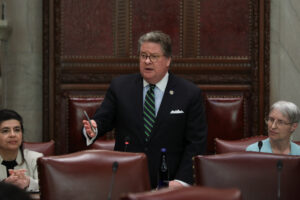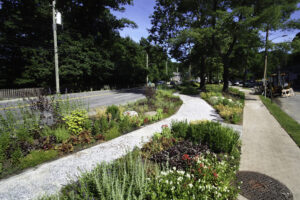 New York State Senator Pete Harckham and his colleagues in the State Senate have approved a bill he reintroduced earlier this year that will help municipalities with parkland restrictions in order to utilize certain parking areas for solar energy projects.
New York State Senator Pete Harckham and his colleagues in the State Senate have approved a bill he reintroduced earlier this year that will help municipalities with parkland restrictions in order to utilize certain parking areas for solar energy projects.
The legislation (S.2995), which will help New York meet the ambitious goals included its landmark Climate Leadership and Community Protection Act (CLCPA), was one of 15 bills in an Environmental Protection Package passed yesterday by the State Senate.
“Climate change is the existential crisis of our time, so we must do everything possible to protect our planet,” said Harckham. “The legislation I introduced to advance renewable energy projects in municipal parks will help in this effort. Still, we need to keep working together to reduce carbon emissions and reduce greenhouse gases. I am confident that my colleagues in the state government understand how important it is that we take action in this regard.”
To see a video clip of Harckham speaking about his bill on the Senate floor, click here.
Under current law, municipalities must request an act from the legislature to alienate parklands that include airspace directly above real property being used for vehicle parking. As New York State looks for ways to implement the CLCPA, interest in solar projects in the airspace above vehicle parking has increased. Solar panels are known as a source of cleaner, renewable energy that also provides cost savings and generates revenue.
Harckham’s bill will allow municipalities to bypass the procedure of requesting the State Legislature to alienate parkland in order to advance solar energy projects under two megawatts that are located directly above real property currently being used for vehicle parking. This will result in certain solar projects being replicated more efficiently, saving time and reducing carbon footprint.
It should be noted that non-park uses by a municipality that requires alienation is a lease for any purpose. Municipalities often find solar projects to have unaffordable upfront costs, so to install solar canopies in their parking lots without incurring debt they will seek to engage with a solar developer who will finance and build the project. The developer then owns the solar installation and sells the electricity, but must make lease payments to the municipality for use of the land and the airspace. Municipalities that can fund and advance solar projects on their own do not need to alienate the parkland.
Yorktown Supervisor Matthew Slater said, “Having recently gone through the parkland alienation process for a renewable energy system, this legislation will help streamline the local approval process and encourage municipalities to explore renewable energy investments. I hope our partners in the Assembly take up the legislation and approve it.”
Croton-on-Hudson Mayor Brian Pugh said, “For local municipalities statewide focused on creating smart renewable energy projects that can also produce financial benefits, the advancing of this legislation is great news. We must all do whatever is possible to fight climate change, and this initiative will put community resources to good use in a safe and eco-friendly manner. I thank Senator Harckham for his ongoing leadership in this effort and other environmental issues.”
Tim Guinee, a leader with the Climate Reality Project, said, “Renewable energy buildout is essential if we are to reach our climate goals. An obvious place for that buildout to occur is above vehicular parking lots. This is smart, targeted legislation that will help cut red tape and get us to our clean energy future.”






